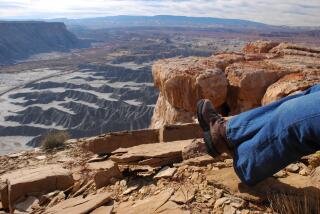Salter Paid for Ad on Land Swap : Conservancy: Beverly Hills councilman’s son-in-law heads group that reached agreement with Bob Hope.
A controversial newspaper ad, in support of the swap of national parkland for property owned by entertainer Bob Hope, was paid for by Beverly Hills City Councilman Max Salter, whose son-in-law heads a conservancy that negotiated the exchange.
Salter said Thursday that his daughter, Pepper Edmiston, asked for the $4,700 as a part of her effort to help form a citizen group to lobby federal legislators to support the proposed agreement. She is married to Joseph T. Edmiston, executive director of the Santa Monica Mountains Conservancy.
“This is something that my daughter really believes in, and I wanted to support her,” Salter said. “And I personally think the transaction is a good one for the state.”
Opponents of the exchange charged that the advertisement, which appeared May 13 in the Westside edition of the Los Angeles Times, was deceptive because it implied that there was already a large grass-roots organization in place to support the swap. They also said the advertisement should have revealed the identities of campaign backers.
The ad identified an organization called Preserve Our Wilderness and called on readers to write and telephone six federal legislators before a key hearing in Washington on the exchange, which involves the exchange of National Park Service land in Cheeseboro Canyon and property owned by entertainer Bob Hope. Lawmakers identified in the ad said that they noticed a slight increase in the number of calls in support of the agreement.
“This touches a nerve because the grass-roots effort opposed to this issue isn’t as moneyed as the people in Beverly Hills are,” said Jill Swift, a long-time Sierra Club leader opposed to the proposed swap.
“I don’t understand why people who support the exchange can’t let it stand on its own merit. Taking out an ad is very, very sexy and says to people, ‘I’ve got enough money that I can throw my weight around.”’
Pepper Edmiston said that she and about 12 others, mainly friends of her and her husband, have only recently formed the organization to begin a lobbying and publicity campaign to support the exchange. The group has not formally met. She said that they have received several hundred letters in response to the ad and will present them to lawmakers.
“I was trying to make a gift for my husband because I believe so strongly in what he is doing,” Pepper Edmiston said. When she was not able to raise funds quickly enough to pay for the ad, she said she turned to her father. “I have always been able to call on my very generous parents.”
Joseph Edmiston said: “I don’t apologize at all” for his father-in-law’s funding or his wife’s effort.
“We work as a family and I am very, very proud of my wife,” said Edmiston, who also is founder and director of the nonprofit Camp Good Times, which sends children with cancer to special summer camps. “When a group of people come to me and say that they want to provide a forum to support the agreement, I’m certainly not going to discourage it.”
Michael Lofchie, the chairman of Preserve Our Wilderness and a professor of political science at UCLA, said that Sen. Alan Cranston’s (D-Calif.) recent stand against the agreement prompted them to find a way to quickly begin to mobilize support for the transaction. A newspaper ad offered a quick and efficient means to garner support, he said.
Three weeks ago, Cranston announced he would urge the Senate Appropriations subcommittee on the interior to adopt a provision that would prohibit the Park Service from using any federal funds to proceed with the exchange for one year.
The terms of the agreement call for Hope to sell 5,700 acres of land he owns in the Santa Monica and Santa Susana Mountains to the conservancy for a below market $20 million. Hope’s attorneys hammered out the agreement with the conservancy after intense public criticism about his sprawling land holdings within the recreation area.
In return for the land, the Park Service would allow a developer to build a road through a 59-acre strip of Cheeseboro Canyon to gain access to Jordan Ranch, owned by Hope but on option to the developer, Potomac Investment Associates, which wants to build a golf course and 750 homes there.
The controversy over the advertisement is reflective of the rift among environmentalists, who have become increasingly polarized over the agreement, which must be approved by Congress.
The proposal had drawn harsh criticism from some who believe that the agreement sets a dangerous precedent because federal parkland would be traded away to a developer.
Supporters maintain that, at a time of federal budget cutbacks limiting the ability to buy expensive parkland in the Santa Monicas, the exchange is the best deal because immensely more land will be preserved for the public than lost to private development.
NEXT STEP Sen. Alan Cranston (D-Calif.), who opposed the agreement, is expected to testify Monday before the Senate Appropriations Committee and urge that funds for Santa Monica Mountains land acquisitions be withheld for one year. Later this month or early in June, the Senate Appropriations interior subcommittee is to decide whether to approve the agreement.
More to Read
Sign up for Essential California
The most important California stories and recommendations in your inbox every morning.
You may occasionally receive promotional content from the Los Angeles Times.










